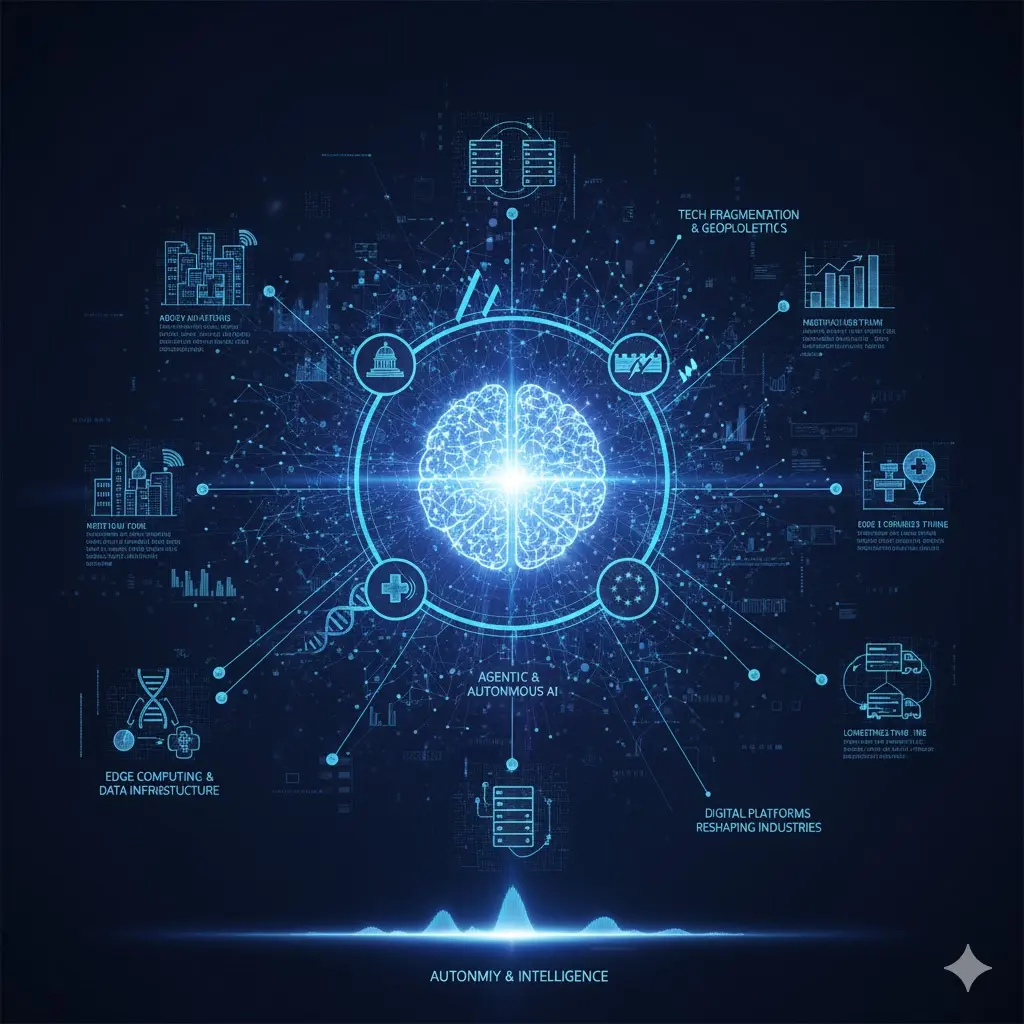
The global technology landscape for 2025–26 is shifting toward greater autonomy and intelligence. According to McKinsey & Company’s Technology Trends Outlook 2025, the next era will be driven by agentic AI, powerful data and edge infrastructures, geopolitical competition in tech regulation, and digital platforms reshaping industries
Overview
The McKinsey’s Technology Trends Outlook 2025 and other leading analysis state that the global technology industry may just be one of the fastest transforming in the world and in 2025 and coming years will see the rise of autonomous AI systems and infrastructure powered through data as well as the technology innovation and regulation of the world’s leading economies competing with one another.
Beyond the AI boom of 2023-2024 will be the first evolution from the narrow “AI assistants” toward more agentic AI.
Key Emerging Themes
1. Agentic and Autonomous AI
AI is going from the passive assistance of clueless AI implementations toward systems that approach and achieve goals of their own accord.
Complex tasks AI systems are capable of executing include software development, data analysis, and workflow automation — all without needing explicit commands for each step in the process.
One illustration is a multi-agent framework in which one intelligent digital worker collaborates with human partners, and they together achieve autonomous business operation goals.
Impact:
The ability of AI systems to ‘decide’ on issues as opposed to ‘recommending’ solutions will force businesses to be more proactive in the development of AI governance frameworks, new job functions that could be called AI operations manager, and a more aggressive approach to cyber protection in the world of uncontrolled AI.
2. Growth of Data Infrastructure and Edge Computing
AI models, IoT devices, and 5G networks are generating unprecedented amounts of data, which is triggering significant investments into cloud and edge infrastructure.
To achieve lower latency and better compliance with data privacy, organizations are transitioning from centralized cloud computing to a distributed architecture.
According to McKinsey, next-gen data centers will create AI-optimized hardware to become strategic national assets as digital sovereignty and economic competitiveness take shape.
Nations that scale data centers and edge computing faster will lead the next wave of digital transformation. Data strategy is now a top-level priority for organizations.
3. Tech Fragmentation and Geopolitics
The race for technology governance and supremacy is influenced by the U.S., China, and the EU. The regulation of AI, supply chain semiconductors, and cybersecurity have resulted in separate digital ecosystems and “tech blocs” with their standards. Economically, the adaptation of products and compliance of multinational firms to new and evolving regulations in different jurisdictions will drive local innovation and, as a consequence, increase the complexity of operational processes.
4. Industries Transformed by Digital Platforms
Thanks to AI, APIs, and cloud technology, the operations of industries like finance, healthcare, and logistics are increasingly being integrated into digital ecosystems.
Examples can be seen in financial services predicting risk using AI, in healthcare analytics for personalized medicine, and in the automation of supply chains by logistics companies with digital twins.
After the Impact:
The first industries to adopt platform models gain resilience and scalability, but new revenue streams are the most important gain of all. The industries that wait too long to adopt platform models will become obsolete and will be forced to rely on external platforms.
Why Strategic Investment Matters:
Understanding these trends enables companies to plan ahead for the necessary skills in the workforce, infrastructure, and data policies that will be required first, or sometimes even only for competitive advantage.
National Advantage:
Countries that predict the need for developing infrastructure, especially data centers, semiconductors, and the cloud, will maintain a digital advantage long into the future.
Governance, Risk and AI:
The more autonomous AI systems become, the more complex ethics and compliance problems become. Governance systems must be updated, and responsible innovation must become the new standard.
Conclusion:
If the previous eras were defined by the AI-enabled systems and technologies, the 2025-2026 period will mark the introduction of new world autonomous technologies, systems, and AI that will drive and support business processes and decision-making.
The next chapter of digital advancement will be defined by organizations, governments, and professionals that invest early in the appropriate AI literacy, resilient data infrastructure, and ethical governance. Those that do not invest early will be left behind in a self-automating world.


